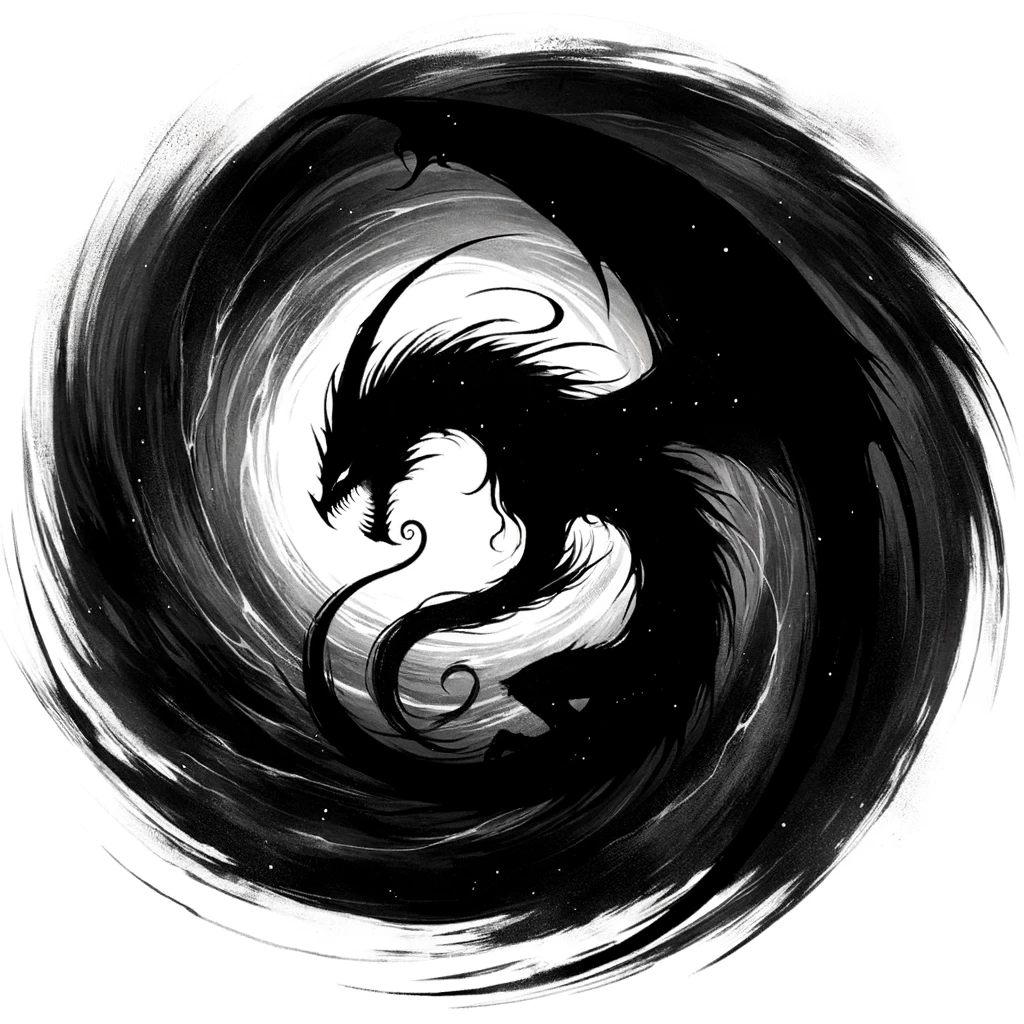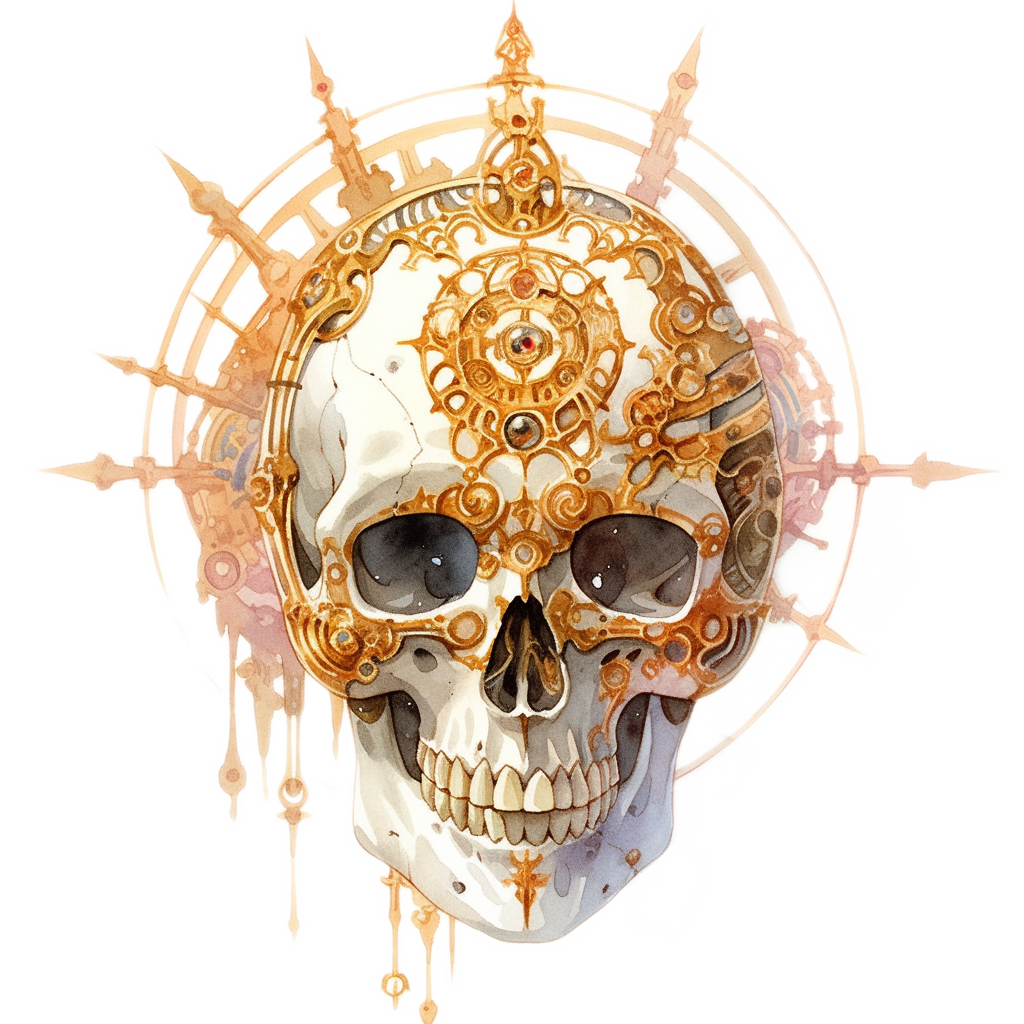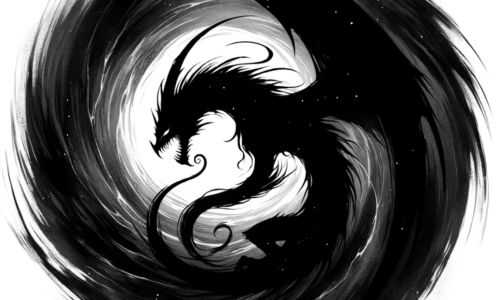Extinction Dragon
Also known as negative energy dragon, negative dragon, death dragon
| CLIMATE/TERRAIN: | Negative Energy Plane, any |
| FREQUENCY: | Very Rare |
| ORGANISATION: | Solitary |
| ACTIVITY CYCLE: | Any |
| DIET: | Special |
| INTELLIGENCE: | Supra-Genius (19-20) |
| TREASURE: | Special |
| ALIGNMENT: | Neutral |
| NO. APPEARING: | 1 (2-5) |
| ARMOUR CLASS: | -5 (base) |
| MOVEMENT: | 12, Fly 35 (C), Jump 5 |
| HIT DICE: | 18 (base) |
| THAC0: | 3 (at 18 HD) |
| NO. OF ATTACKS: | 3+ special |
| DAMAGE/ATTACK: | 1d12 / 1d12 / 5d12 |
| SPECIAL ATTACKS: | See below |
| SPECIAL DEFENCES: | See below |
| MAGIC RESISTANCE: | See below |
| SIZE: | G (60′ base) |
| MORALE: | Fanatic (17-18) |
| XP VALUE: | See below |

Extinction dragons, often called negative dragons, are the exact opposite of infestation/positive energy dragons. They are made up of the very essence of undeath. Because of this, they’re viewed as evil by many creatures. This is completely untrue; they care no more for good or evil than do positive dragons.
Extinction dragons superficially resemble gold dragons (as do infestation dragons). They are pure black in colour, however, and seem to suck the light out of an area. Their eyes are a cold, steely gray, and emanate the very essence of undeath.
Extinction dragons speak their own language, the language of xeg-yi, and a language common to all catastrophic dragons. At birth, 20% of them can speak with any intelligent creature. This chance increases by 7% per age category.
COMBAT: Negative dragons are cunning and devious. They use whatever means they have to defeat their opponents. Fortunately for all of us, they rarely have reasons to fight anything aside from an occasional lich.
BREATH WEAPON/SPECIAL ABILITIES: A extinction dragon’s breath weapon is a cone of negative energy that is 45′ long, 35′ wide, and 20′ high. Creatures caught in the cone lose 1/4 (round up) of their life energy (levels or HD) permanently, and suffer damage; a successful saving throws vs. breath weapon reduces the life energy lose to 1 level and only take half damage. Negative plane protection prevents this life energy loss. A character reduced to 0 or fewer levels dies and becomes a wraith in 2d4 days unless a Restoration or properly worded Wish spell is cast upon them.
- An extinction dragon casts spells and uses its magical abilities at 15th level plus its combat modifier.
- Extinction dragons are born immune to energy draining and with the ability to hide in shadows with a 45% base chance of success; this ability increases 5% per age category to a maximum of 95%. Extinction dragons are also immune to most forms of physical and magical attack. They take double damage from positive energy attacks. They are harmed normally by weapons of +3 or greater enchantment.
- As they age, they gain the following additional abilities: Young: Spectral hand at will. Juvenile: Vampiric hand at will. Adult: Slay living three times per day. Mature Adult: Death spell three times per day. Old: Energy drain three times per day. Very Old: Destruction three times per day.
HABITAT/SOCIETY: Extinction dragons, like all catastrophic dragons, rarely, if ever, leave their home plane. It is rumoured that Factol Skall of the Dustmen has learned how to bind these creatures to his will. Somewhere along the line, one of the previous Doomguard factols is thought to have discovered a similar technique. He is said to have summoned a few to Sigil to cause a little entropy—and then disappeared shortly afterwards. While catastrophic dragons are said to be allies of Primordials, extinction dragons don’t seem to have one they could be associated with. Perhaps, it was the currently-imprisoned Entropy? Or even That-Which-Endures, though this kind of bargaining is uncharacteristic for this Ordial Entity. Or perhaps extinction dragon were simply Prime dragons twisted by the impersonal influence of the Negative Energy Plane.
Like infestation dragons, all extinction dragons are true neutral, with no bend towards chaos, law, evil, or goodness. They are commonly viewed as evil because of their association with undead, though. They have no qualms about taking someone’s life and seem to not even fully grasp the concept of life and living.
ECOLOGY: Extinction energy dragons live off the life force of other creatures. Unlike infestation dragons, who merely bask in it’s presence like a lizard in the sun, extinction dragons actually absorb the energy. They very rarely (once every few hundred years) need to do this, however. It is not known how extinction dragons reproduce, but they have been seen on other planes when there is a large congregation of undead. Perhaps these conditions can cause a vortex to the Negative Energy Plane to appear. Extinction dragons can reproduce like other catastrophic dragons. They use their breath weapon and magical abilities to create a large concentration of death and undeath in one place. They lay entire cities and forests to waste, until the only thing that is left in its wake is a shiny ink-black egg, from which a new dragon hatches. However, like infestation dragons and unlike most of their catastrophic relatives, extinction dragons don’t actively seek to reproduce in such a way, preferring to stay on their home plane. Considering how they are almost unkillable there, it is an understandable strategy.
| Age Category | Body (‘) | Tail (‘) | AC | Breath Weapon | Wizard/Priest Spells | MR | Treasure | XP Value |
| 1 | 13-25 | 12-22 | -2 | 4d12+1 | Nil | Nil | Nil | 20,000 |
| 2 | 25-37 | 22-34 | -3 | 6d12+2 | Nil | Nil | Nil | 21,000 |
| 3 | 37-49 | 34-44 | -4 | 8d12+3 | 1 | 35% | E, S, T | 23,000 |
| 4 | 49-61 | 44-56 | -5 | 10d12+4 | 2 | 40% | H, S, T | 24,000 |
| 5 | 56-73 | 56-66 | -6 | 12d12+5 | 2 2 | 45% | H, S, T | 25,000 |
| 6 | 73-86 | 66-76 | -7 | 14d12+6 | 2 2 2 | 50% | H, S, Tx2 | 27,000 |
| 7 | 86-99 | 76-90 | -8 | 16d12+7 | 2 2 2 2 / 1 | 55% | H, S, Tx2 | 28,000 |
| 8 | 99-112 | 90-101 | -9 | 18d12+8 | 2 2 2 2 2 / 2 | 60% | H, S, Tx2 | 29,000 |
| 9 | 112-126 | 101-114 | -10 | 20d12+9 | 2 2 2 2 2 2 / 2 2 | 65% | H, S, Tx3 | 31,000 |
| 10 | 126-140 | 114-126 | -11 | 22d12+10 | 2 2 2 2 2 2 2 / 2 2 2 | 70% | H, S, Tx3 | 32,000 |
| 11 | 140-154 | 126-139 | -12 | 24d12+11 | 2 2 2 2 2 2 2 1 / 2 2 2 2 | 80% | H, S, Tx3 | 33,000 |
| 12 | 154-168 | 139-152 | -13 | 26d12+12 | 2 2 2 2 2 2 2 2 / 2 2 2 2 | 85% | H, S, Tx4 | 35,000 |
Source: John Kastronis, Jon Winter-Holt, Margarita. Canonwatch: this elemental dragon used to be simply called ‘negative energy dragon’. We made a decision to combine those homebrew dragons with catastrophic dragons from 4e, who were named after natural disasters and other calamities.


